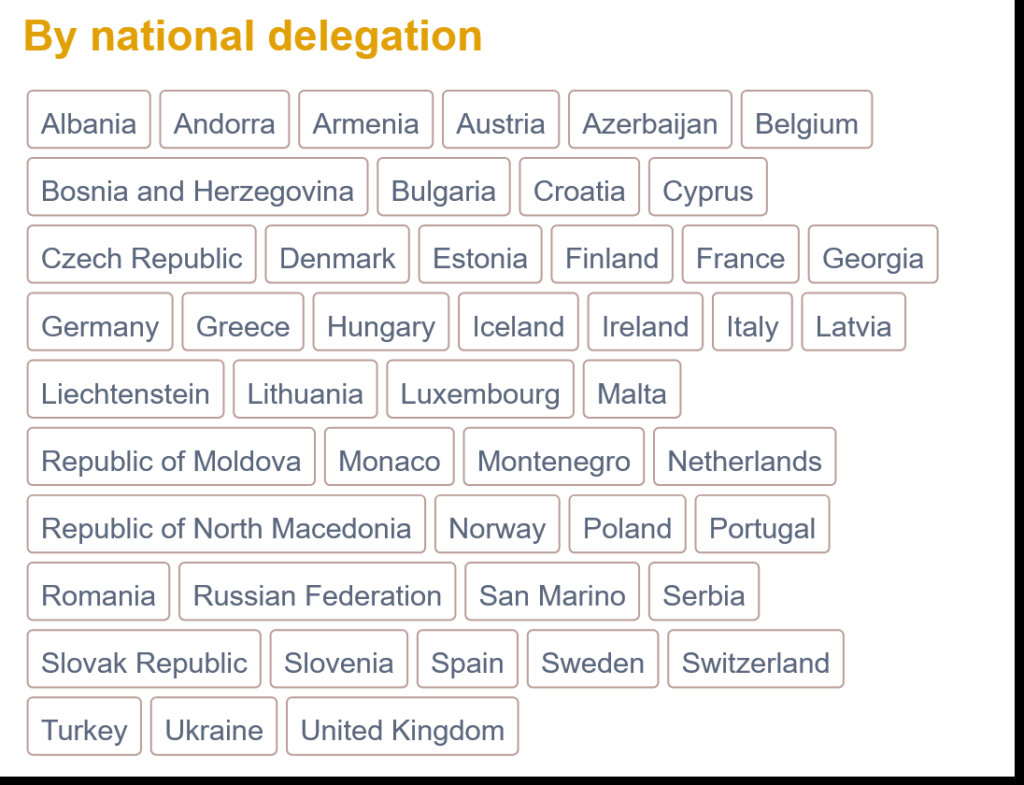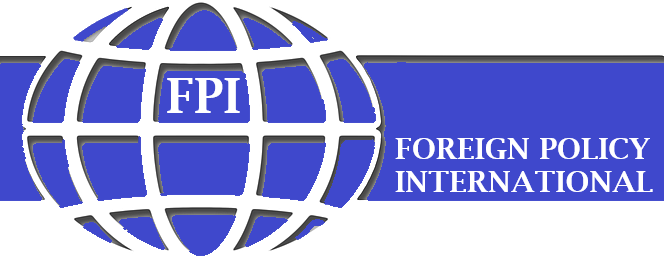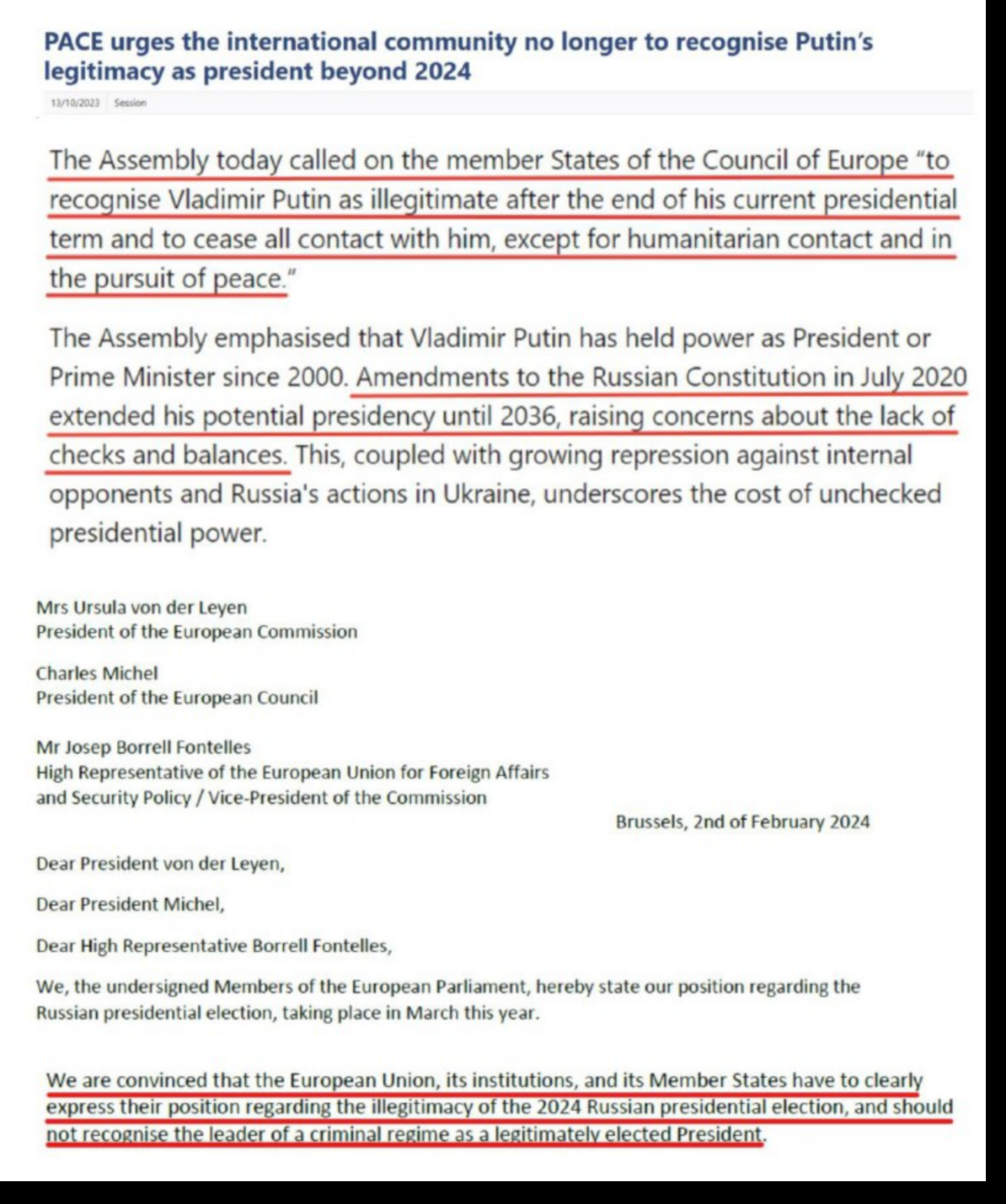Titelbild: Der Aufruf im Wortlaut
Beachten sie, dass das Gleiche Anerkennungs-Prozedere auch für Weißrussland gilt – dort seit 2020 – und der Weißrussische Präsident wird seither als „Machthaber“ bzw. „Diktator“ von den West- Politiker-innen und Journalist-innen bezeichnet.
Nun wird das System auf Russland ausgedehnt (eigentlich nichts Neues also).
Diese Resolution wurde EINSTIMMIG angenommen, also auch die Vertreter von Deutschland und Österreich haben dieser Resolution zugestimmt.
D+Ö werden nach Ablauf der akuellen Legislatur-Periode, Putin nicht mehr als rechtmäßigen Präsidenten Russlands anerkennen, und fordern alle Staaten der Welt auf, dies ebenfalls zu tun.
Erweiterter Effekt: Damit haben die zustimmenden PACE-Staaten (siehe nachfolgende Aufstellung) Russlands Präsidenten (er wird vermutlich die Wahl für sich entscheiden) NICHT mehr als Ansprech-Partner.
Macron, der gerade den Vorschlag machte, Putin und Zelensky mögen miteinander verhandeln (FPI berichtete), weiß das natürlich, und wird auf Basis dieser Parlaments-Entschließung eventuelle Verhandlungsergebnisse zwischen Ukraine und Russland für ungültig erklären lassen, weil Putin (für Europa und damit Frankreich rein rechtlich – völkerrechtlich sieht die Sache sehr viel anders aus) kein Mandat mehr habe, für Russland zu verhandeln.
FRA-Macron: Gespräch mit Putin möglich/ West-Militär-Einsatz in Ukraine höchst-wahrscheinlich – FPI
FPI-Anmerkung: Ein extrem cleverer Trick, den die EU und Frankreich hier anwenden, um einerseits Putin in Verhandlungen zu locken – um sie anschließend für ungültig erklären zu können.

Hier der volle Text:
https://pace.coe.int/en/news/9254/pace-urges-the-international-community-no-longer-to-recognise-putin-s-legitimacy-as-president-beyond-2024
The Assembly today called on the member States of the Council of Europe “to recognise Vladimir Putin as illegitimate after the end of his current presidential term and to cease all contact with him, except for humanitarian contact and in the pursuit of peace.”
The Assembly emphasised that Vladimir Putin has held power as President or Prime Minister since 2000. Amendments to the Russian Constitution in July 2020 extended his potential presidency until 2036, raising concerns about the lack of checks and balances. This, coupled with growing repression against internal opponents and Russia’s actions in Ukraine, underscores the cost of unchecked presidential power.
“The overwhelming power of the President resulting from the extremely long term in office combined with the lack of any checks and balances such as a strong parliament, an independent judiciary, free media and a vibrant civil society has turned the Russian Federation into a de facto dictatorship,” the parliamentarians said.
Unanimously adopting a resolution based on the report by Pieter Omtzigt (Netherlands, EPP/CD), the Assembly recalled the findings of the Council of Europe Venice Commission that “term limit waiver for the incumbent President violates both the Russian constitution and international legal principles.”
The Assembly pointed to the Russian aggression against Ukraine and its consequences as evidence that dictatorships “constitute a threat to the international peace and security and to the territorial integrity and political independence of their neighbours”, as defined in Article 2 of the UN Charter. Consequently, the parliamentarians asserted that restoring democracy in Russia is not only in the best interest of the Russian people but also of Europe and the entire world.
Lastly, the Assembly reaffirmed its support for the establishment of an ad hoc international criminal tribunal “to hold to account the Russian leadership, including Vladimir Putin”, accountable for their actions, starting with the unlawful annexation of Crimea, the war in the Donbas region, and the downing of flight MH17.

